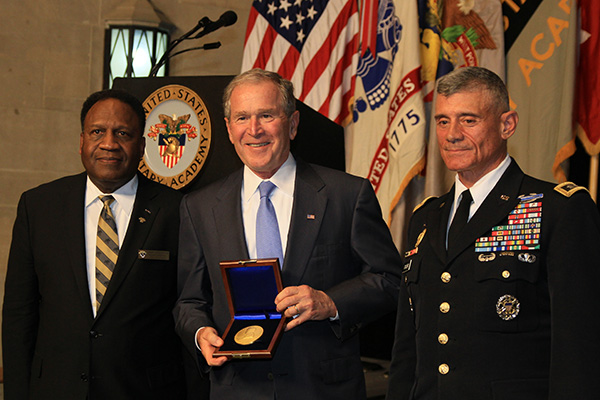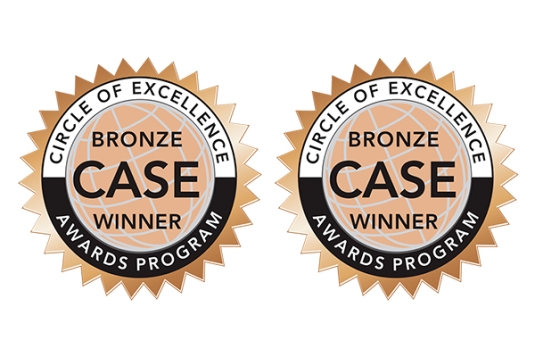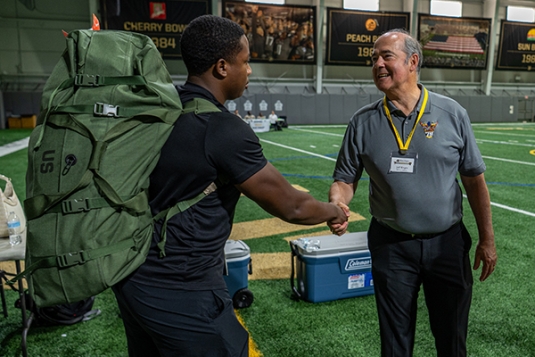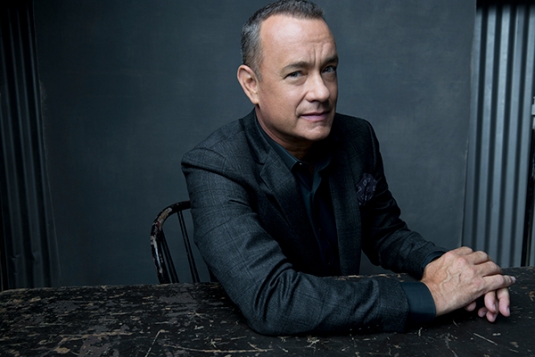According to CDT Kelley Ericson ’21, the Corps of Cadets had been buzzing with excitement all week over the arrival of former President George W. Bush, the 2017 recipient of the Thayer Award, and when he entered Washington Hall for the award dinner and ceremony he received what CDT Jackson Luff ’18 called, “Some of the loudest cheers I ever heard in the Mess Hall.”
Presented annually by the West Point Association of Graduates since 1958, the Thayer Award recognizes a U.S. citizen whose outstanding character, accomplishments, and stature in the civilian community draw wholesome comparison to the qualities for which West Point strives, in keeping with its motto: Duty, Honor, Country. In his remarks introducing the 2017 recipient, LTG (R) Larry Jordan ’68, Chairman of the West Point Association of Graduates, noted the concept of the Thayer Award originated with the Class of 1931, which sought to create an award that would contribute to the public’s understanding of West Point and the principles on which it is built.
In its 60-year history, the Thayer Award has been given to scientists and astronauts, jurists and scholars, members of the clergy and members of Congress, and three former presidents of the United States, including Bush’s father, President George H.W. Bush, the 1994 recipient. “The one thing shared by all Thayer Award recipients is an intense love of country and an untiring effort to make our nation better and stronger,” said Jordan, “President George W. Bush’s name on the Thayer Award plaque greatly enhances the prestige of this institution.”
While there are numerous reasons for presenting Bush the Thayer Award, from his pre-presidency roles as a member of the Texas Air National Guard and two-term governor of Texas to his post-presidency role with the George W. Bush public policy institution, West Point Superintendent LTG Robert L. Caslen ’75 emphasized Bush’s leadership and selfless service following the events of September 11, 2001, during his remarks opening the award ceremony. “In the aftermath of those horrific attacks, our president, George W. Bush, would rally us as a nation and lead us as we confronted a new kind of evil threat, one that attacked us not for our land or wealth, but because of our ideals and because of our freedom,” Caslen said.
In his speech accepting the Thayer Award, Bush also returned to September 11th, particularly to the graduation speech he gave to the West Point Bicentennial Class of 2002 nine months after that fateful day. Quoting that speech, Bush said, “Every West Point class is commissioned in the armed forces, but some West Point classes are also commissioned by history.” In the years following that speech, Bush noted that thousands of graduates have taken up the cause to advance freedom. “They did their duty with honor for their country,” he said. But while the lessons of September 11 are still an important part of the West Point curriculum, Bush said that today’s cadets will face new challenges. He outlined these challenges earlier in the day at the “Spirit of Liberty” forum held at Lincoln Center in New York City, but as he repeated them during his Thayer Award remarks he related specific points to cadets. For example, when he mentioned “living up to civic values,” Bush said, “I am counting on the cadets of West Point to serve as examples of character and integrity for your generation, and I’m confident that you will rise to the occasion.” Later, when discussing the need for American institutions “to step up and provide cultural and moral leadership for this nation,” Bush noted that the country “only need look to where the Hudson River bends to see how to do this.” Summing up his points, Bush said, “We are a nation waiting for a reminder of its better self, and I believe that reminder can be found right here at West Point.”
Bush’s speech was not all serious public policy recommendations. Early on he told cadets that he brushed up on his knowledge of Sylvanus Thayer, Class of 1808 and the Academy’s fifth Superintendent (1817-33) before coming to West Point. “Thayer founded the West Point Dialectical Society to foster debate and good dialect,” Bush noted, “which makes my selection for this honor somewhat puzzling.” But every light-hearted moment was followed by another filled with sincerity. In his speech’s conclusion, for example, he mentioned how people often come up to him and ask if he misses being the president. “I miss the pastry chef,” he joked, but then he offered the following: “There is one thing I miss—a lot—being the commander in chief of a collection of selfless men and women who volunteered to defend the United States in a time of danger … our future leaders who will promote our democratic values and our way of life through their actions and example—men and women who live by the words: Duty, Honor, Country.” The loudest cheers in the Mess Hall, indeed.
Speech
West Point, NY, October 19, 2017
General Jordan, thank you. I am highly honored—(Applause)—I am unbelievably proud to be a Thayer Award winner, and I thank you for this high honor.
General Caslen, thank you, sir, for your leadership. I loved kissing your wife on the cheek. (Laughter and Applause.) I want to thank you and Shelly for your service.
Command Sergeant Major thank you, sir, for your service. I appreciate the Board of Visitors. It’s good to see Ray Odierno, with whom I spent a lot of quality time under some difficult circumstances. General, thank you for being here. A 1989 graduate, Colonel Miguel Howe, who ran the Bush Institute’s Military Service Initiative and is now a Fellow helping our vets transition from military to civilian life—Miguel, we’re glad you’re here.
I want to talk about two other folks here, one of whom is Bryon Vincent, Class of 2005, and Major Abigail Vincent. They met right here at West Point. I painted him! I have become an artist—not a very good one. (Laughter.) But he was one of the subjects. And so when it came time to go to the parade I looked over at the grandstand and said, “I recognize that face—hell, I’ve been living with the guy for about a month trying to get it right.” (Laughter.)
Our first Bush Institute Military Service head was a man named Colonel [Mike] Endres, who sadly passed away. So, I go to his house to try to comfort his wife and his dear daughter. I introduced myself to Taylor and I said, “What are your objectives?”
I was trying to get her mind off her grief, and she said, “I want to go to West Point.”
I said, “Wow. Can you pass the physical?”
She said, “Not a problem.”
I said, “What about taking the entrance exam?”
She said, “I’m taking it tomorrow.”
I said, “You’ve got to be kidding me—48 hours after your dad passed away, you’re going to take the exam?”
She said, “I want to honor my father.”
I’m honored to be in your presence, Taylor. (Applause.)
I want to thank First Captain Simone Askew and the Corps of Cadets for your warm welcome. This is an awesome place. And I know there’s been some excitement among them because you probably think I’ll be able to uphold a longstanding tradition, and that is absolve all the cadets (laughter) who are on restriction for minor conduct offenses. But the problem is, I’m no longer President. (Laughter.) Plus, I don’t think ‘ole Thayer—the “father of the Military Academy” and the demerit system—would have approved it if I tried. (Laughter.)
I studied up on Colonel Thayer before I got here. He was tapped to reform this institution by James Monroe 200 years ago. During his tenure, Thayer imposed a relentless focus on order, discipline, and scholarship that remains the hallmark of West Point. In addition to the 134 Thayer System regulations, he also founded the Dialectic Society in order to foster debate and good dialect—which makes my selection for this honor somewhat puzzling. (Laughter and applause.)
So—Laura and I had dinner with Lorne Michaels, the creator of Saturday Night Live. During the course of the dinner, he told me something very disturbing. He said he put his best writers on me—this is while I was President—and they came up with “strategery.” (Laughter.) I said, “No, I said strategery.”
He said, “No, you didn’t say strategery. We invented strategery.”
I said, “Are you kidding me? For, 16 years, I thought I was the guy who said strategery?” (Laughter.)
He said, “Yep. You never did.”
I said, “Well let me ask you this: Did your writer come up with mis-underestimate?” (Laughter and applause.)
I want to read some of the words of General McArthur. He’s been quoted quite often; I want to be a part of those quotations. (Laughter.)
“This award is not intended primarily to honor a personality, but to symbolize a great moral code—the code of conduct and chivalry of those who guard this beloved land of culture and ancient descent. That I should be integrated in this way with so noble an ideal arouses a sense of pride and yet of humility which will be with me always.”
I know how he feels.
“Duty, Honor, Country: Those three hallowed words reverently dictate what you ought to be, what you can be, and what you will be.”
Those words remind me of the people who have preceded me with this Award—most especially the 1994 award winner, President 41, my dad. He sends his very best to this awesome gathering, and is doing well. (Applause.)
Here’s what Caslen mentioned—I did come here June of 2002 for the bicentennial of West Point, where I gave the graduation speech. I want to share some of what I said that day, right after the September 11th attacks—nine months after the September 11th attacks.
“Every West Point class is commissioned to the Armed Forces. Some West Point classes are also commissioned by history, to take part in a great new calling for their country. History has also issued its call to your generation. In your last year, America was attacked by a ruthless and resourceful enemy.
“You graduate from this Academy in a time of war, taking your place in an American military that is powerful and is honorable. Our war on terror is only begun, but in Afghanistan it began well. This war will take many turns we cannot predict. Yet I am certain of this: Wherever we carry it, the American flag will stand not only for our power, but for our freedom. Our nation’s cause has always been larger than our nation’s defense.
“We fight, as we always fight, for a just peace—a peace that favors human liberty. We will defend the peace against threats from terrorists and tyrants. We will preserve the peace by building good relations among the great powers. And we will extend the peace by encouraging free and open societies on every continent. Building this just peace is America’s opportunity, and America’s duty.”
In the years that have followed that speech, the graduates of West Point have taken their rightful place in history alongside the men and women who preceded them. They advanced the cause of freedom. They did their duty, with honor, for their country. And they proved themselves worthy of the Long Gray Line that stretched before them.
At West Point, you have observed moments of silence here in Washington Hall for former cadets who gave their lives in the war on terror. At West Point, the lessons of 9/11 are still an important part of the curriculum. But for much of the country, memories have dulled with the passage of time.
New challenges have been gathering to the principles we hold dear, and we must take them seriously.
Some of these problems are external and obvious. You know the threat of terrorism all too well. It is being fought even now on distant frontiers and in the hidden world of intelligence and surveillance. There is the frightening and evolving threat of nuclear proliferation and outlaw regimes. There is an aggressive challenge by Russia and China to the rules and norms of the global order—proposed revisions that always seem to involve less respect for the rights of free nations and less freedom for the individual.
These matters would be difficult under any circumstances. They are further complicated by a trend in western countries away from global engagement and democratic confidence. Parts of Europe have developed an identity crisis. We have seen insolvency, economic stagnation, youth unemployment, anger about immigration, resurgent ethnonationalism, and deep questions about the meaning and durability of the [European Union].
America is not immune from these trends. In recent decades, public confidence in our institutions has declined. Our governing class has often been paralyzed in the face of obvious and pressing needs. The American dream of upward mobility seems out of reach for some who feel left behind in a changing economy. Discontent deepened and sharpened partisan conflicts. Bigotry seems emboldened. Our politics seems vulnerable to conspiracy theories and outright fabrications.
There are some signs that the intensity of support for democracy itself has waned, especially among some young Americans who never experienced the galvanizing moral clarity of the Cold War, or never focused on the ruin of entire nations by socialist central planning. Some have called this “democratic deconsolidation.” Really, it seems to be a combination of weariness, frayed tempers, and forgetfulness.
We have seen our discourse degraded by casual cruelty. At times, it can seem like the forces pulling us apart are stronger than the forces binding us together. Argument turns too easily into animosity. Disagreement escalates into dehumanization. Too often, we judge other groups by their worst examples while judging ourselves by our best intentions—forgetting the image of God we should see in each other.
We have seen nationalism distorted into nativism—forgetting the dynamism that immigration has always brought to America. We see a fading confidence in the value of free markets and international trade—forgetting that conflict, instability, and poverty follow in the wake of protectionism.
We have seen the return of isolationist sentiments—forgetting that American security is directly threatened by the chaos and despair of distant places, where threats such as terrorism, infectious disease, criminal gangs and drug trafficking tend to emerge.
In all these ways, we need to recall and recover our own identity. We are a nation waiting for a reminder of its better self. And I believe that reminder can be found right here at West Point.
Earlier today, I gave a speech outlining four recommendations from the Bush Institute on how to revitalize and strengthen our democracy, and restore confidence in it. I’m going to share those with you briefly.
First, America must harden its own defenses. Our country must show resolve and resilience in the face of external attacks on our democracy. That begins with confronting a new era of cyber threats. We cannot have any nation messing with our election process. And I am so pleased that cadets are being educated to work on cybersecurity right here at the Army Cyber Institute at West Point.
The second concerns the projection of American leadership—maintaining America’s role in sustaining and defending an international order rooted in freedom and free markets. Our security and prosperity are only found in wise, sustained engagement around the world and in the cultivation of new markets for American goods. In the confrontation of security challenges—we must confront security challenges before they fully materialize and arrive on our shores. We must foster global health and development as alternatives to suffering and resentment. And we must not shy away from attracting of talent, energy and enterprise from all around the world. We must serve as a shining hope for refugees and a voice for dissidents, human rights defenders, and the oppressed. In these endeavors, I believe the graduates of West Point will lead the way.
A third point is strengthening democratic citizenship. Here we must put particular emphasis on the values and views of our young. And that means the Corps of Cadets will have to step up and lead your contemporaries.
Our identity as a nation—unlike many other nations—is not determined by geography or ethnicity, by soil or blood. Being an American involves the embrace of high ideals and civic responsibility. We become the heirs of Thomas Jefferson by accepting the ideal of human dignity found in the Declaration of Independence. We become the heirs of James Madison by understanding the genius and values of the U.S. Constitution. We become the heirs of Martin Luther King, Jr., when we judge one another not by the color of their skin, but by the content of their character.
This means that people of every religion, race and ethnicity can be fully and equally American. It means that bigotry or white supremacy in any form is blasphemy against the American creed. And it means that the very identity of our nation depends on the passing of civic ideals to the next generation.
We need a renewed emphasis on civic learning in schools. And our young people need positive role models. Bullying and prejudice in our public life sets a national tone, provides permission for cruelty and bigotry, and compromises the moral education of children. The best way to pass along civic values is to live up to them. I’m counting on the cadets of West Point to serve as examples of character and integrity for your generation, and I’m confident you’ll rise to the occasion.
Finally, today I called on the major institutions of our democracy, public and private, to consciously and urgently attend to the problem of declining trust. For example, our democracy needs a media that is transparent, accurate and fair. Our democracy needs religious institutions that demonstrate integrity and champion civil discourse. Our democracy needs institutions of higher learning that are examples of free expression. It is time for American institutions to step up and provide cultural and moral leadership for this nation. And they need only look to where the Hudson River bends to see how to do it.
A guy asked me the other day—he said, “Do you miss being President?”
“Not really.” (Laughter.)
I mean, I miss the pastry chef. (Laughter.) And General, frankly, the helicopters were a little cramped on the flight in from Stewart today. (Laughter.)
But there is one thing I miss, a lot. I miss being Commander in Chief of a collection of selfless men and women who volunteered to defend the United States in a time of danger. Ours is an extraordinary nation that produces millions of courageous souls who willingly step forward to protect our flag and our freedom.
I’m often asked, given the threats to our democracy, whether I’m optimistic about our country’s future. The answer is, absolutely I’m optimistic. Because I have looked into the faces of our future leaders—men and women who will promote our democratic values and our way of life through their actions and their example. Men and women who will live by the words Duty, Honor, Country.
I’m honored to be in your midst. I’m proud to receive the Thayer Award. May God bless you, may He watch over and protect the cadets and graduates of the US Military Academy, and may He continue to bless our great Nation. (Applause.)
END
Biography

The West Point Association of Graduates is pleased to announce that George W. Bush, 43rd President of the United States, will receive the Sylvanus Thayer Award for 2017. The award will be presented on October 19, 2017 during ceremonies hosted by Lt. Gen. Robert L. Caslen, Jr., Class of 1975, Superintendent of the U. S. Military Academy at West Point.
West Point Association of Graduates Board Chairman Lt. Gen. (USA, Ret.) Larry R. Jordan, Class of 1968, said, “The West Point Association of Graduates is honored to present the Thayer Award to President George W. Bush. He is a leader of conviction and resolve who guided our country through the most trying of times following Sept. 11, 2001, and today his service continues in the work of the George W. Bush Institute. Having him forever associated with West Point through the Thayer Award speaks directly to its purpose of recognizing a citizen of the United States, other than a West Point graduate, whose outstanding character, accomplishments, and stature draw wholesome comparison to the qualities for which West Point strives. In fact, the West Point motto—Duty, Honor, Country—is reflected in the basic principles of the George W. Bush Institute’s Military Service Initiative, which are ‘leadership, service, and accountability,’ personal values held and manifested through the public service of President Bush.”
“I thank the West Point Association of Graduates for this high honor,” said President Bush. “As I said in my graduation address to the Bicentennial Class of 2002, ‘West Point graduates leave here marked by the character of this Academy, carrying with them the highest ideals of our nation.’ I am honored to be recognized among those men and women who have dedicated their lives to the values of West Point: Duty, Honor, Country.”
President George W. Bush was born in New Haven, Conn., to Barbara and George H.W. Bush, later the 41st President of the United States, and himself a prior recipient of the Thayer Award (1994). The family later moved to Texas, where Bush grew up in Midland and Houston. He received a bachelor’s degree in history from Yale University in 1968 and a master’s degree in business administration from Harvard Business School in 1975. After college, Bush enlisted in the Texas Air National Guard, was commissioned a second lieutenant, and earned his aviation wings as an F-102 pilot. He was honorably discharged from the Air Force Reserve and settled in Midland, Texas where he started an energy business and married Laura Welch. After working on his father’s successful 1988 Presidential campaign, Bush joined a group of partners that purchased the Texas Rangers baseball franchise. After selling his share of the team in 1994, he successfully ran for governor of Texas, and, in 1998, he became the first governor in Texas history to be elected to two consecutive four-year terms.
In 2000, Bush was elected the 43rd President of the United States and he was re-elected to serve a second term in 2004. During his time in office, Bush accomplished several significant policy initiatives: signing tax relief laws that helped workers keep more of their income, creating comprehensive educational reform, and modernizing Medicare with a prescription drug benefit for seniors. He is most remembered, however, for his leadership after the terrorist attacks on Sept. 11, when he responded to the threat to American lives and to freedom by forming the Department of Homeland Security, committing American military forces to fight the Taliban government in Afghanistan, and working to remove Saddam Hussein from power in Iraq, which ultimately laid the foundation for democracy in that country.
After his Presidency, George and Laura Bush founded the George W. Bush Presidential Center in Dallas, Texas. The Center is home to the Bush Presidential Museum and Library, which houses George W. Bush’s presidential papers. The Center is also home to the George W. Bush Institute, a public policy organization that focuses on economic growth, education reform, global health, human freedom, women’s initiatives, and military service. Built on the principles that guided the Bush family in public life, the Institute uses leading research to develop and implement policies that offer practical solutions to pressing problems in the United States and abroad.
President Bush is author of the recently released Portraits of Courage: A Commander in Chief’s Tribute to America’s Warriors, a collection of paintings and stories honoring the sacrifice and courage of America’s veterans. He is also the author of bestselling books, Decision Points (2010) and 41: A Portrait of My Father (2014).





